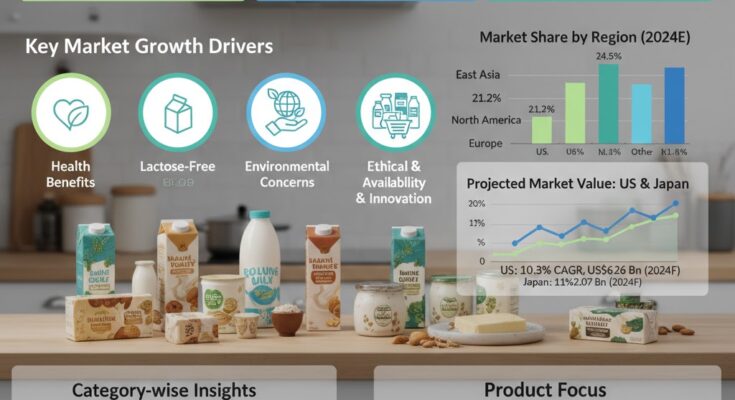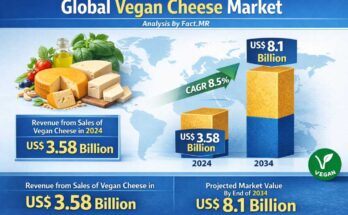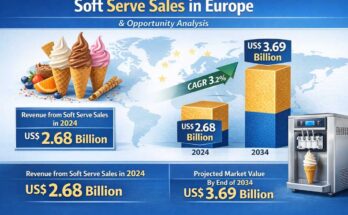The global plant-based dairy market is witnessing remarkable momentum, driven by rising consumer demand for sustainable, lactose-free, and nutritionally rich dairy alternatives. According to an updated research report published by Fact.MR, the market is forecasted to reach a valuation of US$ 14.7 billion in 2024 and expand to US$ 36.69 billion by 2034, reflecting a strong CAGR of 9.6% during the forecast period.
Growing environmental consciousness, increased cases of lactose intolerance, and shifting dietary preferences toward plant-based proteins are key factors propelling global demand. Moreover, major food companies are investing heavily in innovation to deliver products with improved texture, taste, and nutritional value, further fueling adoption across both developed and emerging markets.
Strategic Market Drivers
- Rising Health and Environmental Awareness
Consumers are increasingly opting for plant-based dairy alternatives due to their lower cholesterol content, absence of hormones, and reduced environmental impact compared to conventional dairy. The plant-based trend aligns with global sustainability goals, particularly those aimed at minimizing carbon emissions and conserving water resources.
- Expansion of Product Portfolios and Flavor Innovation
Manufacturers are diversifying their product lines to include plant-based milk, cheese, yogurt, butter, and ice cream, incorporating ingredients like almonds, oats, soy, and coconuts. Exciting flavor innovations—ranging from classic vanilla to exotic matcha and caramel—are expanding consumer appeal and driving repeat purchases.
- Retail and E-commerce Boom
The proliferation of online retail channels and the introduction of dedicated plant-based product aisles in supermarkets are enhancing accessibility and visibility. Brands are leveraging digital marketing strategies and influencer collaborations to reach health-conscious and younger demographics.
- Technological Advancements and R&D Investments
Continuous advancements in food processing, fermentation, and protein extraction technologies are enabling the production of plant-based dairy products with enhanced creaminess, shelf life, and nutrient retention. Companies are actively investing in R&D to replicate the sensory experience of traditional dairy.
Regional Growth Highlights
North America: Mature Market with Strong Brand Presence
The United States and Canada dominate the global market, driven by a robust vegan culture, established retail presence, and innovative product offerings. Leading brands like Danone, Chobani, and General Mills are capitalizing on the surge in flexitarian diets and plant-based preferences.
Europe: Regulation and Sustainability-led Growth
Europe’s plant-based dairy market is thriving under strict sustainability regulations and growing consumer awareness. Countries such as Germany, the U.K., and France are adopting eco-friendly diets, with oat- and soy-based dairy alternatives gaining rapid traction.
East Asia: Rapidly Emerging Consumer Base
In East Asia, countries such as China, Japan, and South Korea are witnessing an upswing in plant-based dairy adoption, fueled by increasing disposable incomes, health awareness, and lactose intolerance prevalence.
Emerging Markets: Latin America and Middle East & Africa
Growing urbanization, changing consumption patterns, and global brand entry are fostering demand in Latin America and the Middle East. Local producers are also entering the space with innovative, affordable options suited to regional tastes.
Market Segmentation Insights
By Product Type
- Plant-based Milk: Dominates global sales due to high penetration in retail and foodservice sectors.
- Plant-based Yogurt and Cheese: Rapidly expanding as consumers seek protein-rich, lactose-free alternatives.
- Plant-based Butter and Ice Cream: Witnessing rising demand among vegan and flexitarian consumers.
By Source
- Almond and Oat: Leading sources owing to their creamy texture and high nutritional content.
- Soy: Continues to maintain market relevance due to its protein density and affordability.
- Coconut and Rice: Gaining favor in tropical and Asian markets for their flavor profiles and functional benefits.
By Distribution Channel
- Supermarkets/Hypermarkets: Major distribution point for premium brands.
- Online Retail: Fastest-growing channel with global reach and convenience.
- Cafés and Specialty Stores: Expanding influence through customized plant-based offerings.
Challenges and Market Considerations
Despite impressive growth, the plant-based dairy market faces a few challenges:
- High Product Cost: Plant-based dairy often remains more expensive than conventional alternatives.
- Taste and Texture Gaps: Achieving dairy-like creaminess and mouthfeel remains an R&D challenge.
- Regulatory Barriers: Labeling restrictions in some regions hinder product marketing and consumer perception.
Competitive Landscape
Key Companies Profiled:
Arla Foods; Daiya Foods Inc.; Danone S.A.; General Mills; Saputo; Chobani; Earth’s Own Food Company Inc.; Unilever; Bel Group; Kraft Heinz; Sanitarium Health and Wellbeing Company; Axiom Foods Inc.; Nestlé; Muller; Sahmyook Foods; Lactalis; Elmhurst 1925; 1.5 Degree; California Farms; NotCo; Planting Hope Company.
Key players in the plant-based dairy market are focusing on improving texture, taste, and nutritional profiles while offering diverse product varieties and innovative flavors. Several companies are scaling up production and investing in next-generation technologies to maintain their competitive edge.
- In August 2024, Elmhurst 1925 launched TerraMeat™ Plant-Based Chick’n, an innovative high-protein plant-based meat substitute that reinforces the company’s leadership in sustainable nutrition.
- In August 2024, 1.5 Degree, a pioneering startup, introduced a wide assortment of plant-based frozen desserts and beverages such as oat milk, soy milk, and gelato in unique flavors like paan, Biscoff, and mocha almond fudge—highlighting the market’s growing experimentation and appeal to global palates.
Conclusion
The plant-based dairy market is set to redefine the global food industry landscape over the next decade. With powerful trends in sustainability, health, and innovation converging, this market represents one of the most dynamic growth frontiers in the alternative protein space. Industry players that strategically align their product innovation, branding, and sustainability initiatives are expected to lead this fast-evolving sector.



